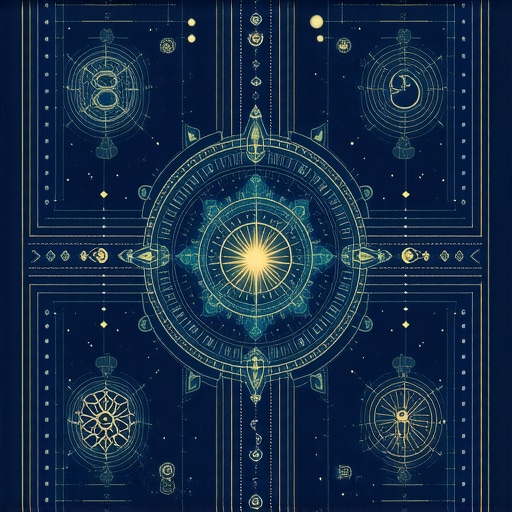Dreaming in Islam: The Nighttime Messenger of Divine Secrets
Ever woken up perplexed after a vivid dream, wondering if it was just a fleeting image or a divine message? In the rich tapestry of Islamic tradition, dreams are often viewed as sacred signs—mysterious whispers from the divine. As someone who’s delved deep into Islamic dream interpretation, I can tell you that understanding these nocturnal visions can open doors to spiritual growth and divine guidance.
Why Do Dreams Hold Such Sacred Significance in Islam?
Islamic scholars have long regarded dreams as a vital link between the earthly and the divine realm. Prophet Muhammad (peace be upon him) emphasized that dreams could be a form of prophecy or divine insight, especially the true dreams (ruyaa). These are more than mere illusions—they’re sacred messages that can forewarn, guide, or reaffirm faith. Interestingly, the Quran mentions dreams multiple times, highlighting their importance in divine communication.
Decoding the Symbols: What Do Dreams Really Mean?
Every dream carries a symbolism that might seem cryptic at first glance. For instance, dreaming of a snake has different interpretations depending on context—sometimes a warning, other times a spiritual test. Want to know more about how Islamic scholars interpret such symbols? Check out what does it mean to dream of a snake in Islam? for an in-depth look.
Are Your Dreams a Reflection of Your Inner Self or Divine Guidance?
This question often puzzles believers—are dreams merely subconscious reflections, or do they serve as divine signs? Islamic tradition suggests that both can be true. Sacred dreams can reveal hidden truths about our spiritual state, upcoming challenges, or divine blessings. Recognizing authentic dreams requires discernment, prayer, and sometimes consultation with knowledgeable scholars.
For those seeking clarity, exploring classical texts like meaning of manam in Islam can shed light on the sacred messages encoded in dreams.
Remember, not every dream is a divine sign—sometimes, the mind simply processes the day’s experiences. But when a dream feels profound or recurring, it’s worth paying attention. Keep a dream journal, pray for guidance, and consult trusted sources to interpret these signs correctly.
Dreams in Islam are a fascinating window into divine wisdom—an ancient, sacred language waiting to be deciphered. So, next time you wake up pondering that mysterious vision, consider it a divine message—perhaps a whisper from the divine, guiding you through the night’s silent symphony.
Feeling inspired? Share your dreams or insights below. And for a deeper dive into how dreams connect with divine messages, explore understanding Islamic dream interpretation. As the scholars say, dreams are a gift—an opportunity to see beyond the veil of the unseen.
Unlocking the Hidden Messages: How Sacred Symbols in Dreams Reveal Divine Guidance
Have you ever awakened wondering if a particular symbol in your dream carried a divine message? Islamic dream interpretation offers profound insights into the sacred symbols that appear during sleep, serving as divine whispers guiding us through life’s spiritual journey. These symbols are not mere coincidences; they are carefully encoded messages from Allah, waiting for the discerning eye to interpret their meanings.
The Language of Symbols: Deciphering Divine Messages in Dreams
Islamic scholars have long emphasized that dreams are a sacred language of divine communication. For example, dreaming of water often symbolizes spiritual purity and divine guidance, while a snake might represent a spiritual test or danger, depending on its context. Such symbols are described in detailed classical texts, like interpretations of dreams about losing teeth in Islam, which highlight the importance of understanding dream symbolism to grasp divine messages.
Could Your Dreams Be a Sacred Call for Action or Reflection?
This question is vital for believers seeking to deepen their faith—are these symbols calling us to act, reflect, or seek divine forgiveness? The answer often lies in the context and emotional tone of the dream. For instance, dreaming of a mosque may symbolize spiritual renewal and divine acceptance, urging us to strengthen our faith, while dreams of fire might warn of divine displeasure or the need for repentance. Recognizing these symbols requires prayer, patience, and sometimes consultation with knowledgeable scholars or trusted Islamic dream dictionaries like Islamic dream dictionary interpreting dreams of animals.
Furthermore, understanding sacred symbols in dreams aligns with the principles outlined by scholars like Ibn al-Nabulsi, who emphasized that dream symbols are divine signs meant to guide believers towards righteousness and spiritual growth. When encountering symbols such as a crescent moon or a star, believers should reflect on their spiritual significance and seek divine guidance through prayer and supplication.
For those eager to explore more, studying the understanding Islamic dream interpretation can deepen your grasp of how sacred symbols serve as divine messengers. Remember, each symbol carries layers of meaning—some visible, others hidden—requiring discernment and sincere supplication to decode properly.
Engaging with these divine messages can transform your spiritual outlook, turning dreams from fleeting images into meaningful signs that illuminate your path. Whether it’s a symbol of divine mercy or a warning to rectify your actions, recognizing these signs is a step towards spiritual enlightenment and divine closeness.
Feeling inspired? Share your experiences with sacred symbols in dreams or suggest more topics you’d like to explore in the comments. For further insights, don’t forget to visit meaning of manam in Islam and deepen your understanding of divine messages hidden in your dreams.
Deciphering Sacred Symbols in Islamic Dreams: A Key to Divine Communication
In the rich spiritual tradition of Islam, dreams are regarded as a sacred language—an intricate code that conveys divine messages through symbols and signs. Recognizing and interpreting these symbols can open profound pathways to spiritual insight, guidance, and personal growth. But how do we accurately decode this divine language? The answer lies in understanding the classical and contemporary frameworks that scholars have developed over centuries.
The Sacred Lexicon of Dreams: Classical Sources and Modern Interpretations
Islamic scholars like Ibn Sirin and Al-Nabulsi laid foundational principles for dream interpretation, emphasizing that symbols are not arbitrary but deeply meaningful. For example, water often signifies purity and divine mercy, while a serpent may symbolize spiritual tests or hidden dangers, depending on the context. These interpretations are documented in authoritative texts such as interpretations of dreams about losing teeth in Islam. Such texts serve as invaluable guides for believers seeking clarity in their visions.
What Are the Nuances in Interpreting Dream Symbols Across Different Contexts?
One critical aspect of Islamic dream interpretation is the context—both emotional and situational. A dream of a mosque might symbolize spiritual renewal, but if accompanied by fear or anxiety, it could indicate feelings of spiritual neglect or upcoming tests. Conversely, dreaming of fire might serve as a warning or as a symbol of divine purification, depending on the dreamer’s circumstances. This layered approach requires a nuanced understanding of Islamic theology, psychology, and symbolism, often necessitating consultation with knowledgeable scholars or trusted dream dictionaries.
For example, the crescent moon and stars are often viewed as signs of divine guidance and hope. Recognizing these symbols and their placement within the dream can help believers discern whether they are being called to prayer, reflection, or action. The work of scholars like Ibn al-Nabulsi highlights that symbols serve as divine messages—each with a hidden meaning that, once understood, can significantly influence one’s spiritual journey.
To deepen your understanding, engaging with resources such as understanding Islamic dream interpretation is highly recommended. These texts explore the layers of symbolism and teach how to approach dreams with sincerity, prayer, and patience—essentials for accurate interpretation.
The Practical Art of Dream Interpretation: From Symbol to Action
Transforming dream symbols into actionable divine guidance involves more than mere analysis. It requires a heartfelt prayer for clarity, a sincere intention to understand Allah’s message, and often, consultation with knowledgeable elders or scholars. Keeping a dream journal can assist in identifying recurring symbols or themes, which might indicate ongoing spiritual lessons or divine warnings.
Moreover, embracing a holistic approach—combining Islamic teachings, psychological insights, and personal intuition—can enrich the interpretation process. Remember, not every dream bears divine significance; some are simply reflections of subconscious thoughts. However, when a symbol resonates deeply or recurs persistently, it warrants further exploration and prayerful reflection.
If you wish to explore this fascinating subject further, I encourage you to delve into classical and contemporary texts on Islamic dream symbolism. Recognizing and understanding these divine messages can profoundly enhance your spiritual journey, turning nocturnal visions into guiding lights on your path to righteousness.
Have you experienced a dream that you believe carried divine significance? Share your insights or questions below, and continue your exploration by visiting meaning of manam in Islam. Remember, in the sacred language of dreams, every symbol is a divine whisper—waiting for your mindful attention to unlock its meaning.

How Do Sacred Symbols in Dreams Serve as Divine Blueprints for Spiritual Progress?
In Islamic tradition, symbols encountered in dreams are not random but are carefully woven threads in the divine tapestry of guidance. Scholars like Ibn Sirin and Al-Nabulsi have emphasized that understanding these symbols can unlock profound insights into our spiritual journey, acting as divine blueprints for growth and righteousness. For instance, dreaming of a river often represents spiritual purification and divine mercy, while a dark cloud might signal divine warnings or upcoming tests. To interpret these symbols accurately, believers must approach their dreams with sincerity, prayer, and study of classical texts, such as the understanding Islamic dream interpretation.
What Are the Nuances in Interpreting Dream Symbols Across Different Contexts?
The key to mastering sacred dream symbolism lies in grasping the nuances of context—both emotional and situational. A dream of a mosque may symbolize spiritual renewal, but if tinged with fear, it could indicate spiritual neglect or divine testing. Conversely, dreaming of a bright star may symbolize divine guidance and hope. Recognizing these layers requires a deep familiarity with Islamic teachings, psychology, and symbolism, often aided by consulting trusted scholars or authoritative dream dictionaries. For example, the interpretations of dreams about losing teeth in Islam highlight how physical symbols adapt their meanings based on context. Engaging with these resources enhances understanding and ensures that interpretations align with divine wisdom.
How Can Dream Symbols Encourage Practical Action Without Misinterpretation?
Transforming sacred symbols into actionable divine guidance requires a heart that is humble and receptive. Believers are encouraged to pray for clarity, seek knowledge from trusted sources, and reflect on their dreams with patience. Keeping a detailed dream journal can help identify recurring symbols that may signify ongoing spiritual lessons or divine warnings. For example, a recurring vision of water might prompt a believer to seek spiritual cleansing or renewal. Additionally, consulting authoritative texts such as the Islamic dream dictionary interpreting dreams of numbers can provide deeper insights into the symbolic language of dreams. Ultimately, recognizing divine messages in dreams is an act of worship and trust in Allah’s wisdom, guiding believers toward righteousness and spiritual fulfillment.
What Are the Risks of Misinterpreting Sacred Symbols in Dreams?
While dreams hold immense potential for divine insight, misinterpretation can lead to confusion or misguided actions. It is vital to approach dream symbols with humility, prayer, and consultation with knowledgeable scholars. The Quran advises believers to seek knowledge and avoid hastily attributing meanings to dreams without proper understanding. As stated in dream interpretations about losing teeth, incorrect interpretations can distort spiritual messages and even lead to sin if one acts on mistaken assumptions. Therefore, a cautious yet sincere approach—grounded in Islamic principles—is essential for translating dream symbols into beneficial spiritual steps.
Engaging with these sacred symbols thoughtfully transforms dreams from mere nocturnal images into powerful tools for divine guidance. When approached with sincerity and humility, dreams can serve as divine whispers—guiding believers through the complexities of life and spirituality. Have you experienced a dream that you believe carried divine symbolism? Share your insights or questions below, and explore more about sacred dream messages at meaning of manam in Islam. Remember, every symbol in your dreams is a divine whisper waiting to be deciphered by a sincere heart.
Expert Insights & Advanced Considerations
1. Dream symbolism as a spiritual language
In Islamic tradition, dreams serve as a divine language, rich with symbolism that requires scholarly interpretation. Recognizing the subtle nuances in symbols like water, fire, or animals can reveal deeper spiritual truths and divine guidance, emphasizing the need for study of classical texts and consultation with knowledgeable scholars.
2. The importance of context in dream interpretation
Contextual understanding is crucial—dreams involving symbols such as mosques or stars must be analyzed within the emotional and situational framework of the dreamer. This nuanced approach helps differentiate between spiritual messages and subconscious reflections, ensuring accurate divine communication.
3. The role of prayer and sincerity in decoding dreams
Authentic interpretation is rooted in sincerity, prayer, and humility. Engaging in supplication and keeping a dream journal enhances the ability to discern divine signs, transforming dreams into powerful tools for spiritual growth and righteousness.
4. Risks of misinterpretation and how to avoid them
Misinterpreting sacred symbols can lead to confusion or misguided actions. It’s essential to seek knowledge, avoid hasty conclusions, and consult trusted scholars or authoritative dream dictionaries like Islamic dream dictionary interpreting dreams of animals. Proper caution safeguards the spiritual integrity of dream interpretation.
5. Dreams as a pathway to divine closeness
When approached with humility, dreams become a sacred bridge, guiding believers towards divine mercy and understanding. Recognizing divine symbols in dreams can illuminate your spiritual path, encouraging righteousness and divine awareness in everyday life.
Curated Expert Resources
- Islamic Dream Dictionary: An authoritative resource that deciphers the symbolism of dreams in Islam, providing detailed interpretations of common and rare symbols.
- Al-Nabulsi’s Dream Interpretation: Classic Islamic texts offering profound insights into dream symbolism, emphasizing the spiritual significance of various signs.
- Scholarly Articles on Dream Psychology: Contemporary academic works that explore the psychological and spiritual dimensions of dreams within Islamic thought.
- Classical Texts by Ibn Sirin: Foundational works that lay the groundwork for Islamic dream interpretation, essential for deep scholarly study.
- Official Islamic Websites: Platforms like Understanding Islamic Dream Interpretation provide updated insights and community support.
Final Expert Perspective
Immersing oneself in the sacred realm of Islamic dreams reveals a profound connection between the spiritual and divine. Recognizing the significance of dream symbolism, understanding context, and approaching interpretation with sincerity are vital for unlocking divine messages. These insights are not merely academic; they are keys to divine closeness and spiritual enlightenment. Engage deeply with classical texts and trusted resources, and remember that every dream holds the potential for divine guidance. Your journey into the sacred language of dreams is a step toward greater faith and divine understanding. If you are eager to explore this further, consider sharing your experiences or questions below, and continue your quest for divine insight through trusted Islamic scholarship.



![Mole Tunnels: Why Your Foundation is Being Undermined [Warning]](https://en.islamskisanovnik.net/wp-content/uploads/2026/01/Mole-Tunnels-Why-Your-Foundation-is-Being-Undermined-Warning.jpeg)